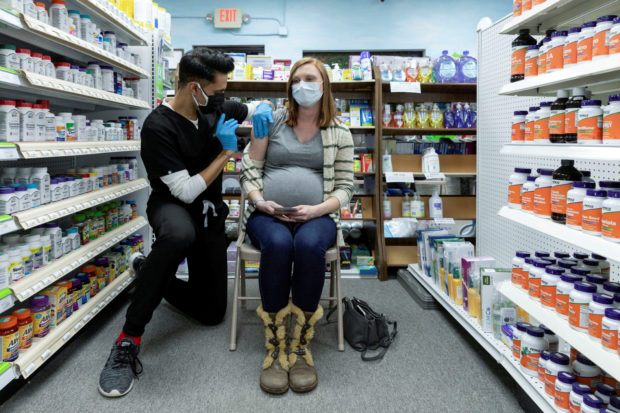
Michelle Melton, who is 35 weeks pregnant, receives the Pfizer-BioNTech vaccine against the coronavirus disease (COVID-19) at Skippack Pharmacy in Schwenksville, Pennsylvania, U.S., February 11, 2021. REUTERS/Hannah Beier/File Photo
The following is a summary of some recent studies on COVID-19. They include research that warrants further study to corroborate the findings and have yet to be certified by peer review.
COVID-19 vaccines not linked with pregnancy loss
Two studies in major medical journals add to evidence that COVID-19 vaccines are safe before and during pregnancy.
One study, published in The New England Journal of Medicine on Wednesday, tracked nearly 18,500 pregnant women in Norway, including about 4,500 who had miscarriages.
Researchers found no link between COVID-19 vaccines and risk of first-trimester miscarriage, regardless of whether the vaccines were from Moderna, Pfizer, and BioNTech, or AstraZeneca.
Overall, the women with miscarriages were 9% less likely to have been vaccinated, according to the researchers’ calculations.
In a separate study published on Thursday in The Lancet, researchers tracked 107 women who became pregnant while participating in trials of AstraZeneca’s vaccine in the UK, Brazil, and South Africa. Seventy-two of the women had received the vaccine while the others got a placebo.
AstraZeneca’s vaccine had no effect on the odds of safely carrying the pregnancy to term, the researchers reported.
“It is important that pregnant women are vaccinated since they have a higher risk of hospitalizations and COVID-19-complications, and their infants are at higher risk of being born too early,” the authors of the Norwegian study wrote. “Also, vaccination during pregnancy is likely to provide protection to the newborn infant against COVID-19 infection in the first months after birth.”
Vaccine combinations with different technologies may be best
Healthcare workers in France who got the first shot of AstraZeneca’s COVID-19 vaccine and then the Pfizer/BioNTech vaccine for their second shot showed stronger immune responses than those who had received two shots of the Pfizer vaccine, in a recent study.
Combining different technologies is known to boost immune responses to other viruses, and the current study suggests it may be true for the coronavirus as well. Both vaccines in the study deliver instructions that teach cells in the body to make a piece of protein that resembles the spike on the coronavirus and that triggers an immune response. But they do it in very different ways.
Both protocols provided “safe and efficient” protection, said Vincent Legros of Universite de Lyon in France, co-author of a report published on Thursday in Nature. But combining the AstraZeneca shot with the Pfizer/BioNTech vaccine “conferred even better protection” than two doses of Pfizer’s shot, including against the Delta variant, Legros said.
The two technologies combined induced an antibody response of better quality, with more neutralizing antibodies that could block the virus, and more cells that have been “trained” by the vaccine to have increased defense potential, he said.
Combination vaccination “is safe and may provide interesting options… for clinicians to prevent SARS-CoV-2 infection,” Legros concluded.